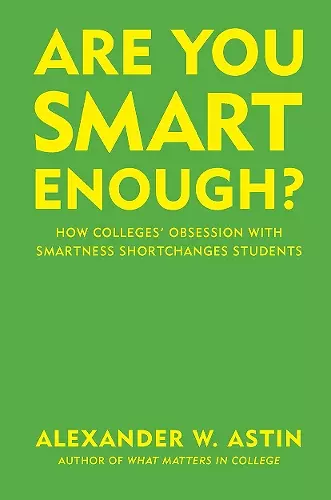Are You Smart Enough?
How Colleges' Obsession with Smartness Shortchanges Students
Format:Hardback
Publisher:Taylor & Francis Inc
Published:6th Apr '16
Currently unavailable, and unfortunately no date known when it will be back
This hardback is available in another edition too:
- Paperback£25.99(9781620364482)

This book explores the many ways in which the obsession with “being smart” distorts the life of a typical college or university, and how this obsession leads to a higher education that shortchanges the majority of students, and by extension, our society’s need for an educated population. The author calls on his colleagues in higher education to return the focus to the true mission of developing the potential of each student: However “smart” they are when they get to college, both the student and the college should be able to show what they learned while there.Unfortunately, colleges and universities have embraced two very narrow definitions of smartness: the course grade and especially the standardized test. A large body of research shows that it will be very difficult for colleges to fulfill their stated mission unless they substantially broaden their conception to include student qualities such as leadership, social responsibility, honesty, empathy, and citizenship. Specifically, the book grapples with issues such as the following:• Why America’s 3,000-plus colleges and universities have evolved into a hierarchical pecking order, where institutions compete with each other to recruit “smart” students, and where a handful of elite institutions at the top of the pecking order enroll the “smartest” students.• Why higher education favors its smartest students to the point where the “not so smart” students get second-class treatment.• Why so many colleges find it difficult to make good on their commitment to affirmative action and “equality of opportunity.”• Why college faculties tend to value being smart more than developing students’ smartness (i.e., teaching and learning).
“Professor Astin discusses a fundamental defect in the way professors and college officials regard their students, their own approach to teaching, and the quality of their institution. Every faculty member, dean, and college president can benefit from reflecting on the message of this book and pondering its implications for the way they go about their work.”
Derek Bok, former President of Harvard University
"For five decades, Alexander Astin has been one of the most powerful voices in higher education. In this volume, he challenges colleges and universities to shift their focus from selecting excellent students to developing excellence in all students. This is a book about the fundamental purposes of college that should be read by those who work in, attend, or care about higher education."
Arthur Levine, President, Woodrow Wilson National Fellowship Foundation, and President Emeritus, Teachers College, Columbia University
"This provocative work from a towering figure in higher education twists the kaleidoscope to reveal an unconscious bias that ought to worry us. Astin argues that a preoccupation with conventional "smartness" pervades faculty culture, widens inequities, and perpetuates assessment methods that foster unhealthy competition while they fail to measure what matters: whether students are learning and colleges are improving society. He encourages educators to open their minds to distortions implicit in the relentless race to recruit the smartest of the smart. We should all slow down long enough to absorb this wise book."
Diana Chapman Walsh, President Emerita, Wellesley College; Trustee Emerita, Amherst College; MIT Corporation executive committee
"Under Sandy Astin’s brilliant tutelage, a talented cadre of educational researchers and innovators has provided compelling evidence on the practices that work best to foster deep learning and advance underserved student success in college. But the question remains: why don’t educators seize on this evidence to drive far-ranging change in higher education’s core educational practices? Mincing no words, Astin now answers that question, and calls for a radical recasting of educators’ most fundamental assumptions about 'talent' and 'merit.'
In this direct and compelling challenge to the profession, Astin accurately points out that educators devote far more attention to the credentials, readiness, and 'merit' of students we admit to college than we do to what actually happens to students’ learning as they progress toward the finish line. Probing the self-serving assumptions that hold bad pedagogical practice in place, Astin calls on educators, not just to examine our values and beliefs, but to radically amend them."
Carol Geary Schneider, President
Association of American Colleges and Universities
"While it seems a simple point that American colleges and faculty value being and acquiring smart over developing smartness, this observation proves a riveting and profound starting place for insights about rankings, test scores, admissions, grades, academic standards, remedial education, faculty culture, and reform. Astin imagines what a university focused on enhancing learning, adding value and affective learning might be like. This is a powerful and important book."
José Antonio Bowen, President of Goucher College and author of Teaching Naked
“This book is must reading for higher education faculty members and administrators. I resonate powerfully with Dr. Astin’s central tenet – that ‘Strengthening the education of students at all levels is vital to the welfare of our society.’ Without character development, simply increasing graduates’ smarts will not create the multi-cultural, globally interdependent democracy we value and need.”
Arthur W. Chickering, Author of Cool Passion: Challenging Higher Education
"Sandy Astin's body of research and scholarship constitute one of the great intellectual treasures in the study of higher education. His new book reminds us that the development of intellectual talent across the full range of student ability, and not just a fixation with the brightest, is what we should be about. It is an important clarion call for American postsecondary education."
Ernest Pascarella, Professor and Mary Louise Petersen Chair of Higher Education, University of Iowa
ISBN: 9781620364475
Dimensions: unknown
Weight: 340g
160 pages